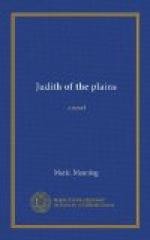At noon she brought the children home to dinner, and afterwards Jim taught them to throw the lasso and played buffalo with them. Alida did not trust herself to watch them; she stayed in the kitchen and saw the sunbeam grow pale with the waning of the day, the day whose minutes dragged like lead, yet had rushed from her, leaving her the night to face. At sundown she cooked supper, but she no longer knew what she did. A crazy agility had taken possession of her and she spun about the kitchen, doing the same errand many times, finding herself doing always something different from that she had set about doing. The molten day was burning itself out like a fever; hot gusts of air beat up from the earth, but the woman who waited felt chilled to the marrow, and took a cloak down from a peg and wrapped it about her while she waited for the biscuit to bake. At supper they sat down together, the man and his wife and their three children. The children were in fine spirits from the fun they had had that afternoon. Never had daddy been so nice to them. He had taught Topeka to throw the lasso so well that she had caught the cat once and little Jim twice; and daddy had played he was a buffalo and had charged them all with his head down, till they screamed in terror. But daddy seemed more quiet through the meal, and once mother started up and cried:
“What’s that?”
She ran to the door with her hand pressed to her side, but daddy called after her:
“Don’t you know the cowards better than that? They’ll wait for nightfall.”
But these things had not worried the children, with their heads full of playing buffalo and throwing the lariat.
“Jim,” said his father, before they went to bed, “remember you are the man of the family.” But young Jim was already nodding with sleep. Topeka and Judith were sleepy, too; they kissed their father and were glad to go to bed.
The night began menacingly to close over the wilderness. Where the sun had hung above the mountain a moment before there glowed a great pool of red that dripped across the blackness in faint tricklings. The outlines of the foot-hills loomed huge, formless, uncouth. In the half-light it seemed a world struggling in the birth-throes. All day the dry, burning heat had quivered over the desert, like hot-air waves flickering over a bed of live coals, and now the very earth seemed to palpitate with the intensity of its fever. The bellowing of the thirst-maddened cattle had not stopped with the twilight that brought no dew to slake their parched throats. In the hills the coyotes wailed like lost souls. It was night bereft of benisons, day made frightful by darkness. All the heat of a cycle of desert summers seemed concentrated in that house in the valley where the man and his wife waited. Each sound of the desert night Alida translated into the trampling of horses’ feet; then, as the sound would die away, or prove to be but some night noise of the wilderness, the pallor would lose its pinch on her features, and she would stare into her husband’s face with eyes that did not see. Jim smoked his pipe and refilled it, smoked and filled again, but gave no sign of the object of his waiting.




